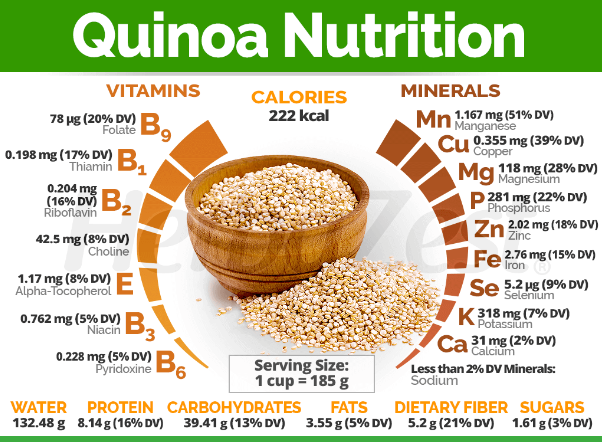PUBLIC HEALTH – Quinoa nutrition stands out as a powerhouse in the world of healthy eating. Often labeled a superfood, quinoa offers a rich array of nutrients that can benefit your health in various ways. Whether you’re looking to enhance your diet, boost your energy levels, or simply explore new foods, understanding quinoa’s nutritional profile is essential. In this post, we’ll dive deep into quinoa nutrition, its benefits, how to prepare it, and why it deserves a place on your plate.
What Is Quinoa?
A Brief Introduction to Quinoa
Quinoa, pronounced “keen-wah,” is a seed that originates from South America. It belongs to the amaranth family and has been cultivated for thousands of years. Although often referred to as a grain, quinoa is technically a seed. Its versatility and health benefits make it a popular choice among health enthusiasts and food lovers alike.
Types of Quinoa
While white quinoa is the most common variety, you can also find red, black, and even tri-color blends. Each type has a slightly different flavor and texture, but all provide similar nutritional benefits.
The Nutritional Profile of Quinoa
A Balanced Source of Macros
Quinoa is unique among plant-based foods because it offers a complete protein profile. This means it contains all nine essential amino acids. For those following a vegetarian or vegan diet, this makes quinoa a fantastic protein source.
Protein Content
A single cup of cooked quinoa provides about 8 grams of protein. This is significantly higher than most grains, making it an excellent option for anyone looking to increase their protein intake.
Carbohydrates and Fiber
In addition to protein, quinoa is rich in carbohydrates, providing a quick source of energy. However, it has a low glycemic index, which means it won’t spike your blood sugar.
Dietary Fiber
Quinoa also packs a punch when it comes to fiber. One cup contains around 5 grams of dietary fiber, promoting healthy digestion and helping you feel full longer.
Vitamins and Minerals
Quinoa nutrition shines with its impressive array of vitamins and minerals. Here are some of the key nutrients you’ll find:
- Magnesium: Essential for muscle function and energy production.
- Iron: Vital for transporting oxygen in the blood.
- Zinc: Supports immune function and skin health.
- B Vitamins: Important for energy metabolism and brain health.
Health Benefits of Quinoa
Supports Weight Management
Thanks to its high protein and fiber content, quinoa can aid in weight management. The combination of these nutrients helps you feel satisfied, reducing the likelihood of overeating.
Promotes Heart Health
Quinoa contains heart-healthy fats, such as omega-3 fatty acids. These can lower cholesterol levels and reduce the risk of heart disease. Additionally, its magnesium content helps regulate blood pressure.
Boosts Digestive Health
The dietary fiber in quinoa plays a significant role in promoting gut health. It supports regular bowel movements and can help prevent constipation.
Provides Antioxidants
Quinoa is rich in antioxidants, including quercetin and kaempferol. These compounds fight inflammation and protect your cells from damage caused by free radicals.
How to Prepare Quinoa
Cooking Basics
Cooking quinoa is straightforward. Start by rinsing the seeds under cold water to remove any bitter saponins. Then, combine one cup of quinoa with two cups of water or broth in a pot. Bring it to a boil, then reduce to a simmer and cover for about 15 minutes. Once the liquid is absorbed, fluff it with a fork.
Creative Serving Suggestions
Quinoa’s nutty flavor and chewy texture make it a versatile ingredient. Here are some delicious ways to enjoy quinoa:
Salads
Use quinoa as a base for salads. Combine it with fresh vegetables, nuts, and a light dressing for a refreshing meal.
Bowls
Create hearty grain bowls by layering quinoa with your favorite protein, vegetables, and sauces.
Breakfast
Quinoa can even be a great breakfast option. Cook it with almond milk, add some fruit and nuts, and you have a nutritious morning meal.
Common Misconceptions About Quinoa
Is Quinoa a Grain?
While it’s often categorized with grains, quinoa is technically a seed. This distinction matters for those with specific dietary needs, especially gluten intolerance, as quinoa is gluten-free.
Is Quinoa a Complete Protein?
Yes, quinoa is one of the few plant-based foods that provides all nine essential amino acids. This makes it an excellent protein source for vegetarians and vegans.
Incorporating Quinoa Into Your Diet
Easy Swaps
Incorporating quinoa into your meals can be simple. Substitute quinoa for rice or pasta in your favorite recipes. You’ll not only add more nutrients but also enjoy a different texture and flavor.
Meal Prep Ideas
Consider cooking a batch of quinoa at the beginning of the week. Store it in the refrigerator and use it throughout the week in salads, stir-fries, or as a side dish.
Final Thoughts on Quinoa Nutrition
A Smart Choice for Everyone
Quinoa nutrition offers a wealth of benefits, making it a smart addition to any diet. Its versatility allows it to fit seamlessly into various dishes, whether you’re looking for a hearty lunch or a light dinner.
Embrace the Superfood
If you haven’t tried quinoa yet, now is the time. Explore its unique flavors and discover how it can enhance your meals. With its impressive nutritional profile and health benefits, quinoa truly deserves its reputation as a superfood.
In conclusion, understanding quinoa nutrition empowers you to make informed choices for your health. With its complete protein, fiber, and an array of essential vitamins and minerals, quinoa stands out as a fantastic food for anyone seeking to enhance their diet. Enjoy experimenting with this nutritious seed, and watch as it transforms your meals for the better
REFERENCE : https://boursessenegal.com/



